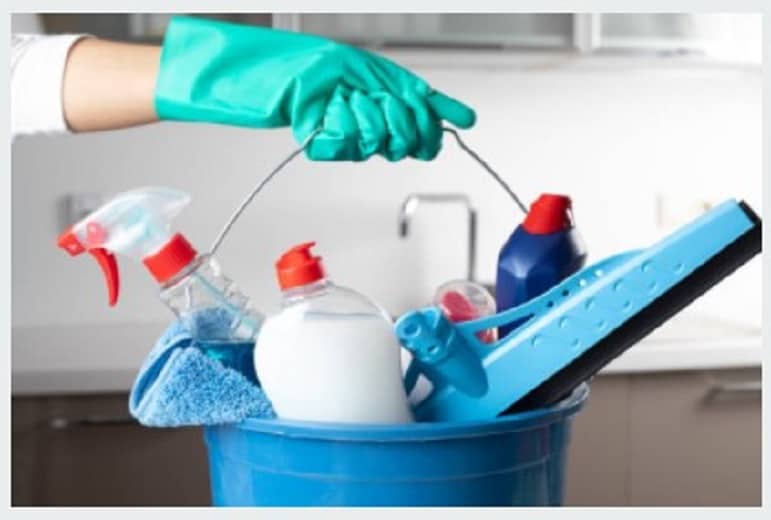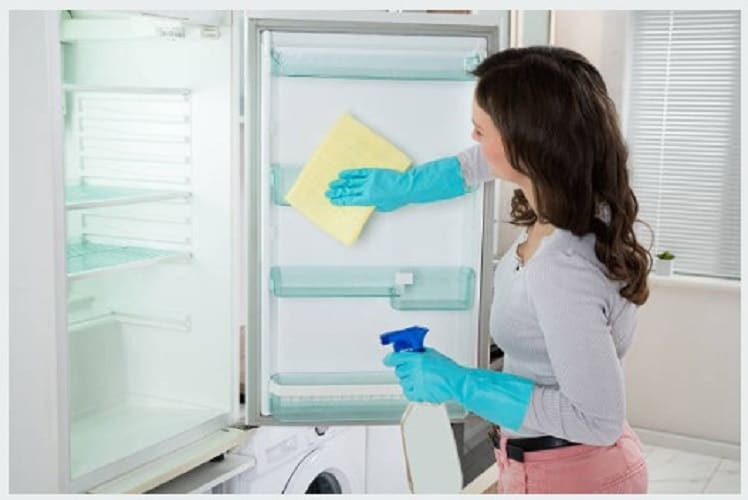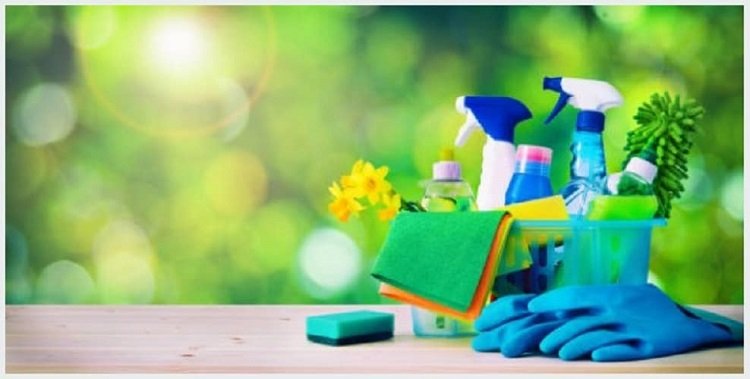Are you tired of the strong and unpleasant smell of bleach lingering in your home? We’ve all been there. While bleach is a powerful disinfectant, it can leave a lasting odour that can be hard to eliminate.
Whether you’ve recently used bleach to disinfect your surfaces or simply can’t seem to shake the scent from a previous cleaning, we’ve got you covered with these DIY methods for removing the bleach smell.
Say goodbye to the bleach smell and hello to a fresh and clean home. From natural odor absorbers like baking soda and vinegar to the power of citrus and essential oils, we’ve got you covered.
So put down the air freshener and read on for practical and effective solutions to banish that bleach smell. Not only will your home smell better, but you’ll also learn about the science behind these odour-fighting methods.
Get ready to impress your friends and family with your newfound knowledge and fresh-smelling home.
DIY On How to Get Rid of Bleach Smell from a room that has been cleaned with bleach or other strong cleaners?
Bleach is an effective disinfectant that can leave a strong and unpleasant odor. If you’ve recently used bleach and are now struggling with the smell, there are several things you can do to get rid of it. Here are some DIY methods:
- Ventilate the area: Open up windows and doors to let fresh air in, and use fans to circulate the air. This will help to dilute the bleach smell and improve the overall air quality in your home.
- Use baking soda: Baking soda is a natural odor absorber that neutralizes the bleach smell. Sprinkle baking soda on the affected area and let it sit for a few hours before vacuuming.
- Use vinegar: Vinegar is another natural odor absorber that neutralizes the bleach smell. Mix equal vinegar and water and spray the solution onto the affected area. Allow it to sit for a few minutes before wiping it with a clean cloth.
- Use activated charcoal: Activated charcoal is a powerful odour absorber that can eliminate the bleach smell. Place activated charcoal in a container and leave it in the affected area for a few days. It will absorb the bleach smell and leave the area smelling fresh.
- Use citrus: Citrus fruits like lemon, lime, and orange can help to neutralize the bleach smell. Cut up some citrus fruits and place them in a bowl in the affected area. The fruit’s natural oils will help absorb the bleach smell and leave the area smelling fresh.
- Use essential oils: Essential oils like lavender, peppermint, and eucalyptus can be used to mask the bleach smell. Mix a few drops of essential oil with water and spray the solution onto the affected area. The oil will help to mask the bleach smell and leave the area smelling fresh.
- Use air purifiers: Air purifiers can help to filter out the bleach smell from the air. Place an air purifier in the affected area and let it run for a few hours.
- Wash fabrics and surfaces: Fabrics and surfaces can hold onto odors from bleach or other cleaners. Wash fabrics such as curtains, bed linens, and upholstery in the washing machine with a cup of vinegar. Wipe down surfaces with vinegar and water to remove any lingering odors.
- Use ozone generators: Ozone generators can help remove odors by producing ozone molecules that break down and neutralize odors. However, using ozone generators safely and according to instructions is important.
- Use coffee grounds: Coffee grounds are another natural odor absorber. Place dry coffee grounds in a bowl or sachet and leave them in the room for a few hours.
It’s important to always use bleach and other strong cleaners in a well-ventilated area to minimize the risk of inhaling harmful fumes. If you have sensitive airways or allergies, you may want to consider using natural cleaning products or consulting a professional cleaner to avoid using harsh chemicals altogether.
DIY On How to Use Vinegar to Get Rid of Bleach Smell

If the bleach comes into contact with your skin, you’ll know from the lingering odor.
The smell of bleach is irritating, but white vinegar can be used to neutralize the scent, as long as it is handled properly so as not to emit toxic fumes.
It can be a bit of a struggle to get rid of bleach smells in a room, but it’s not complicated.
To let out the smell, you can start by opening as many windows and doors as possible, providing good airflow in and out of the house. Secondly, position some fans in front of the windows and the room facing inside.
Finally, you can either take activated charcoal or even pure baking soda, put it on a plate or tray, and position it inside the room. Hopefully, it will absorb the odor and, in conjunction with the other efforts, remove the pungent bleach smell from the room.
[Read More on House Smells Like Bleach After Cleaning:Vinegar is an outstanding product with thousands of applications, and if you want to use vinegar to get rid of chlorine fumes, then here is how you do it:
Bleach smells in a whole batch of clothing
- This is simply because you must wash the laundry like usual and apply 1/4 cup of vinegar to the washing machine.
Vinegar is also a fantastic softener to clothing, which you get as an additional advantage using this approach.
When you remove the clothes from the dryer, and the chlorine smell remains, you have to reverse the procedure and rewash them with soap and vinegar.
Bleach scent in one room
- If the bleach scent is in the kitchen, you should boil some vinegar in a small pot on the stove to extract it.
Are the smells in another room? Put a bowl of vinegar somewhere in the room.
Shut the door (make sure all windows are closed tight, too), and keep it like that for 24 hours.
Bleach smell on your hands
- In a well-ventilated place, wash your hands with a splash of bleach.
Ensure you clean until the greasy feeling leaves your hands and the smell is gone.
When finished, you can rinse your hands with warm water for a while so that no more smells still linger on them.
If you washed your house with bleach and can’t wash the scent off your hands, don’t panic because there’s hope.
Here are some ways to get rid of the bleach odor when it’s heavy on your hands:
- Dishwashing liquid: Often, normal soap extracts the chlorine scent from your skin, but instead, use dishwashing liquid when this doesn’t function. Dishwashing cleaner is formulated primarily to eliminate several different odors and ingredients.
The bleach smell is more challenging to get rid of than ordinary soap. Ensure you clean both your fingertips and underneath your fingernails correctly so that any trace of scent is lost. Nevertheless, if the first time doesn’t work, repeat the process until it does.
- Scented lotion: Scented lotions also mask the bleach odor, mainly when using a strong fragrance.
Choose a fragrance you love, apply a drop of the lotion on each of your hands, and rub all this together mostly to coat the whole hand with the lotion.
It eliminates the odor of bleach and makes the hands feel even smoother.
- Lemon juice: Take a lemon, slice it in half, and massage it for a full minute all over your hands.
Both fresh lemon juice and bottled lemon juice can also work for this.
You can also use citrus juice if that’s what you’ve got, but lemon juice works much better.
Bleach smells on small clothing items.
- If you have a towel or t-shirt that reeks of bleach, you should put it in a bowl filled with a mixture of one part water to one aspect of vinegar and let it soak.
Hold it in place for at least an hour, then rinse the object in cold water to finish the process.
Read more on House Cleaning Secrets Step-By-Step Guide
What’s going to happen if you get bleach on your skin?
Getting bleach on your skin can cause irritation and chemical burns. Bleach is a highly corrosive substance that can damage the skin and cause pain, redness, and swelling. If you get bleach on your skin, it’s important to act quickly to minimize the damage.
The first step is to remove any clothing or jewelry that has come into contact with the bleach. Rinse the affected area with cool water for at least 20 minutes to help dilute the bleach and wash it away. You can also use a neutralizing solution like vinegar or lemon juice to help neutralize the bleach and stop it from reacting with your skin.
If the affected area is still painful or swollen after rinsing with water, seek medical attention immediately. A healthcare professional can provide treatment to soothe the pain and prevent infection. They may also prescribe topical or oral medications to help the affected area heal.
It’s important to wear gloves and protective clothing when working with bleach to prevent accidental contact with the skin. If you do get bleach on your skin, act quickly to minimize the damage and seek medical attention if necessary.
Different Non-Washable products with Bleach Scent

Other than just clothes, hands, and rooms that may reek the smell of bleach, the said product may also be used for other things.
Take a look, for example, at the following methods for eliminating the heavy scent of bleach:
- Freezers and refrigerators: take everything out of the machine and spray the whole interior with lemon juice – you can use either new or distilled juice again.
When you do this, you must keep it open before it’s fully dry, which can take a few hours if you use a lot of juice.
- Sinks in the kitchen and bathroom: You can begin by rinsing the sink with plenty of water to see how that helps. If not, pour the baking soda over the drain to see if it works.
Bleach fumes in sinks almost always emanate from the drain, so it’s best to clean the drain thoroughly. Another tip: You should even use coffee instead of baking soda!
- Upholstery and drapes: Put the couch cushions or drapes in the sun outside for several hours if you can, turning them over now and then.
If that doesn’t work, rent a small ozone machine and run it inside the room where the upholstery has been for at least six hours.
This will help eliminate the odors, including rugs and carpets.
Read more on How to Clean a Stovetop
Health risks associated with inhaling bleach fumes
Bleach is a strong chemical disinfectant commonly used to clean and sanitize household surfaces. However, when used improperly or in high concentrations, bleach can produce harmful fumes that can cause health problems.
Inhaling bleach fumes can irritate the eyes, nose, and throat and cause coughing, wheezing, and shortness of breath. Prolonged exposure to bleach fumes can also lead to more serious health issues, such as asthma, bronchitis, and other respiratory problems.
The main component in bleach that can cause health problems is chlorine gas. Chlorine gas is produced when bleach is mixed with other chemicals, such as ammonia, acids, or vinegar.
Mixing bleach with other chemicals can create a toxic gas that can be deadly in high concentrations. It’s important never to mix bleach with other chemicals and always to use bleach in a well-ventilated area to avoid inhaling the fumes.
In addition to chlorine gas, bleach can produce other harmful byproducts, such as chloramines and trihalomethanes. These chemicals can also cause respiratory problems linked to cancer and other health issues.
Protecting yourself from the health risks associated with inhaling bleach fumes is advisable. It’s important to use bleach safely and effectively. Always follow the instructions on the label, and never mix bleach with other chemicals.
Use bleach in a well-ventilated area, and wear gloves and a mask to protect yourself from fumes. See medical attention immediately if you experience bleach exposure symptoms, such as coughing, wheezing, or shortness of breath.
Can you sleep in a room with bleach?
Sleeping in a room that has recently been cleaned with bleach or still has a strong odour is not recommended. Inhaling bleach fumes can irritate the eyes, nose, and throat, as well as coughing and breathing difficulties.
Prolonged exposure to bleach fumes can also lead to more serious health issues, such as asthma, bronchitis, and other respiratory problems.
If you must sleep in a room where bleach has been used, it’s important to ventilate the area by opening windows and doors and using fans to circulate the air.
Leave the room for a few hours to allow the bleach fumes to dissipate before returning. Additionally, avoid direct contact with any surfaces that have been cleaned with bleach until they have been thoroughly rinsed and dried.
Using bleach safely and effectively is important to avoid the risks of inhaling bleach fumes. Always follow the instructions on the label, and never mix bleach with other chemicals. Use bleach in a well-ventilated area, and wear gloves and a mask to protect yourself from fumes.
If you experience any symptoms of bleach exposure, such as coughing, wheezing, or shortness of breath, seek medical attention immediately.
How do you avoid breathing bleach when cleaning?
When cleaning with bleach, avoiding breathing in bleach fumes is essential. Here are some tips to help you avoid breathing bleach when cleaning:
- Use in a well-ventilated area: Always use bleach in a well-ventilated area to allow fumes to dissipate. Open windows and doors to increase airflow and use fans to help circulate the air.
- Wear protective gear: Wear gloves and a mask to avoid direct contact with bleach and reduce the risk of inhaling fumes.
- Avoid mixing bleach with other chemicals: Mixing bleach with other chemicals, such as ammonia or vinegar, can create harmful fumes. Always read labels carefully and avoid mixing bleach with other chemicals.
- Dilute bleach properly: Dilute bleach properly according to instructions to avoid using too much bleach, which can create strong fumes.
- Use alternatives to bleach: Consider using natural cleaning products, such as vinegar or baking soda, instead of bleach to avoid using harsh chemicals altogether.
- Take breaks when cleaning with bleach to avoid prolonged exposure to fumes. Step outside for fresh air if you feel lightheaded, dizzy, or nauseous.
- Dilute the bleach: Always dilute the bleach with water before using it. Follow the instructions on the label to ensure you are using the correct amount of bleach and water.
- Rinse thoroughly: After using bleach, rinse surfaces thoroughly with water to remove any residue.
Final Thoughts on How To Get Rid of Bleach Smell
In conclusion, removing the bleach smell in your home is a manageable task with the right tools and techniques.
Whether you’re dealing with a spill or want to freshen up your space after cleaning many easy and practical solutions help banish that pesky odour.
Keep your home smelling fresh and inviting by incorporating these easy strategies into your cleaning routine.
And remember, always prioritize safety when working with bleach and other powerful cleaning agents.
With some know-how and innovative strategies, you can say goodbye to the bleach smell and enjoy a cleaner, more pleasant living space.
So why wait? Put these tips into action today and start enjoying a fresher, more inviting home!
Read More on Best Detergent For Colors To Clean Stubborn Stains

